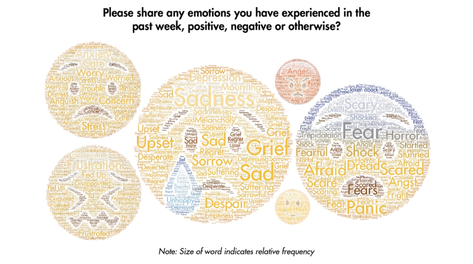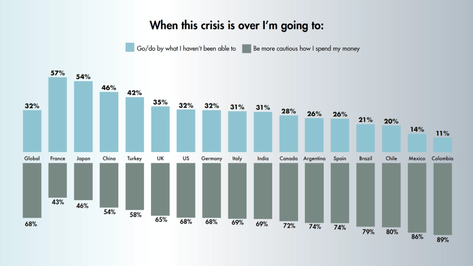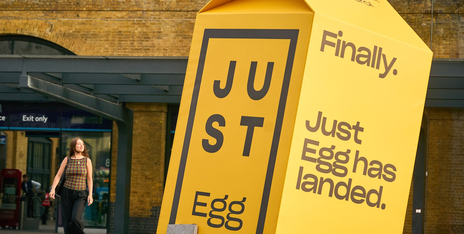No going back to normal
Published on 10th June 2020When it comes to navigating the pandemic, there is no going back to normal. “Truth About Culture and Covid-19 Wave 4” is the fourth study by McCann’s global intelligence unit – McCann Worldgroup Truth Central. The report identifies how key global and generational attitudes regarding the COVID-19 pandemic are shifting as the crisis progresses.
Only 1/3 (38%) of people globally say they want to go back to life as it was before rather than changing their lives to reflect what they’ve learned according to the latest research conducted amongst 14,000 people.
Moreover, 1/2 of people globally agree that the world will be forever changed by the coronavirus outbreak. And in markets where the pandemic has been particularly disruptive, such as in the UK and US, this belief is even more common at 60% and 58% respectively. Across every aspect of our modern lives, this crisis is forcing us to reconsider our social structures and value systems. One of the more immediate shifts in culture has had to do with who we designate as idols and the ensuing outpouring of support for frontline workers. Over half of people globally agree that healthcare workers are today’s true heroes (rising to 67% in France and 65% in the UK). In stark contrast, there’s a common sentiment that celebrities have missed the mark when it comes to their attempts at empathizing with ordinary people. 1 in 8 people globally say they’re frustrated with celebrities right now, and this is highest in China at 28%.
As countries begin to establish new plans to recover from coronavirus, people all around the world are reminiscing at how life used to be prior to the pandemic. 1 in 4 people globally say they took their life for granted before (rising to 60% in Japan and 65% in China). However, we’re also a witnessing a strong spirit of optimism and positivity towards what the future will hold. 41% of people globally say they’re grateful for the good in their lives right now, suggesting that in this period of self-reflection, our attitudes and priorities in life have been reconsidered. And 1 in 6 people globally say they’ve even discovered a better version of themselves during the pandemic, a testament to our human resilience and adaptability in times of crisis. So even though we may never be the same again, there is clearly a large contingent who sees that as an opportunity for the world to change for the better.
Pandemic takes a mental toll
Beyond the immediate health concerns associated with coronavirus, people must also contend with the psychological effects of living through a global pandemic. Overall, 1/3 of people globally say they feel more anxious than they did before. This is highest in Japan at 55% and has remained notably high in China at 30% even after their lockdown period has ended. Unfortunately, this seems to indicate that the long tail of coronavirus will continue to drive generalized stress long after new confirmed cases have stopped.
One of the clearest effects of coronavirus-induced anxiety has been its negative impact on our sleep patterns. 1 in 4 people globally say they’re finding it harder to sleep (rising to 40% in Mexico). Part of this restlessness can be attributed to fears that friends and family members are struggling in isolation. In fact, 2 in 5 people globally say they’re worried about themselves or loved ones suffering alone (rising to 50% in Chile). This tracks closely with the emotional analysis we’ve conducted as part of our latest Truth About Culture and COVID-19 survey. In Latin America, we found that people are describing their state of emotions using anxiety-related terms 1.6x more than the global average. At a global level, negative emotions comprised the overwhelming majority of participant responses. The predominant answers ranged from feeling of sadness, fear, anxiety, and frustration.

An emerging concern has also arisen from the fact that measures to curb the spread of coronavirus are seen as a threat to personal privacy. Only 1 in 6 people globally say they’re ok with their data being used to help protect others. Of course, these attitudes vary by market as attitudes towards data privacy were locally nuanced long before the coronavirus outbreak. For example, 45% of people in China say they’re ok with their data being used to help protect others vs. just 18% in the US where there has been increased talk of implementing a contact tracing platform using our smartphone location data. This widespread concern over data surveillance methods clearly illustrates that efforts to combat coronavirus must be considered hand in hand with the psychological impact on the populace.
Proceeding with caution
Economic concerns related to coronavirus continue to outpace our fears around public health. 58% of people globally now say they are concerned that the economy will suffer, up 10% from mid-March. Similarly, 31% of people globally are concerned that they will lose their job or personally struggle financially, also up 10% from mid-March. On the other hand, every market we’ve surveyed since March is now less concerned that lots of people will die than they were towards the start of the outbreak. As a result, one long-term effect of the crisis will be the emergence of greater cautiousness when it comes to our financial decisions. 1 in 4 people globally say they don’t feel like they can plan for their futures right now (rising to 37% in France). These uncertain times are forcing us all to consider what our bare necessities are and what luxuries we can do without.
Despite local efforts to stimulate the economy through greater spending, over 2/3 of people globally say that when this crisis is over, they’re more likely to be cautious about how they spend their money vs. doing/buying what they haven’t been able to. Although some markets are more divided on this subject, the North and Latin American regions are proceeding especially cautiously. Which means that the challenge for brands and entire industries is only just getting started. For a brand to navigate this crisis, it must offer a sense of security and comfort in a situation that feels bereft of both.




